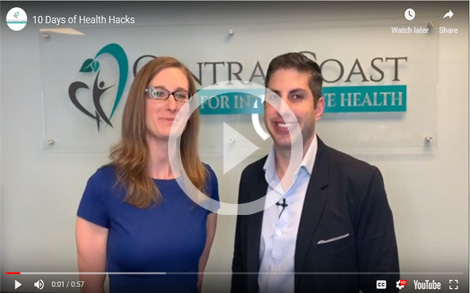A Different Perspective on Hashimoto’s Thyroiditis
If you have received a Hashimoto’s diagnosis, then you were probably told that you have a problem with your thyroid gland and the solution is to take a thyroid pill— for life. We look at this differently. Using a functional medicine perspective, we see Hashimoto’s not as a thyroid gland issue, but as an autoimmune disease. If we can address and turn off the underlying triggers of the autoimmune process, then we can reverse Hashimoto’s disease. Unfortunately, most doctors tell their patients, “you will be on this pill for the rest of your life” (and you still won’t feel yourself). But we tell patients we can turn around Hashimoto’s. We can help them get into remission. Hashimoto’s is a major area we focus on in our practice and we see people go into remission all the time. Keep reading to learn more about Hashimoto’s disease and the nine underlying triggers that we address to turn off the autoimmune attack.
What is Hashimoto’s Disease?
Your thyroid is a gland that is small and shaped like a butterfly in your neck. It is responsible for several hormones including thyroid-stimulating hormone (TSH), triiodothyronine (T3), and thyroxine (T4). Brain and growth development, body temperature, metabolism, how fast your heart beats and other body functions are all influenced by thyroid hormones.
Hashimoto’s disease, a form of autoimmune hypothyroidism, is a condition that causes an underactive thyroid. When someone has Hashimoto’s, their immune system makes antibodies that attack the thyroid gland. The thyroid then doesn’t produce enough thyroid hormones, which results in hypothyroidism. Hashimoto’s disease often affects women between the ages of 40 and 60 years old; although it can affect women of other ages, and men, too.
Your risk of getting Hashimoto’s increases if you have:
- A family history of someone with Hashimoto’s
- Recently gave birth (postpartum thyroiditis)
- Autoimmune diseases such as lupus, rheumatoid arthritis, celiac disease, pernicious anemia (a deficiency of vitamin B12) or type 1 diabetes
While you may not experience symptoms for years before a diagnosis of Hashimoto’s – eventually the damage to your thyroid will begin to exhibit physical symptoms such as:
- A goiter (enlarged thyroid)
- Fatigue
- Joint pain
- Muscle aches
- Constipation
- Pale, dry skin
- Weight gain
- Hair loss
- Brittle nails
- Enlarged tongue
- Puffy face
- Depression
- Hoarseness
- Issues with memory
- Sensitivity to cold
- Problems getting pregnant
- Menstrual bleeding is longer than usual.
I Have Been Diagnosed with Hashimoto’s, What Now?
If you receive a diagnosis from a conventional doctor, you will then be prescribed a medication to replace your thyroid hormone. The #2 prescribed drug in the US, you will likely be given levothyroxine and you will be told you need to take it for the rest of your life. During this time your TSH (thyroid-stimulating hormone) levels will need to be consistently tested to see if the dosage is correct or needs to be changed. Side effects include hair loss, headache, hot flashes, insomnia, sweating, irritability, heartbeat issues, menstruation changes, and weight changes. You may notice that you still have hypothyroid symptoms and you and your doctor can’t get the dose right. This medicine also interacts with a range of other medications including antidepressants.
We feel that with functional medicine, there is a better way. Functional medicine determines how and why illness occurs and restores health by addressing the root causes of disease for each individual. Untreated Hashimoto’s can lead to health issues including goiters, cardiovascular risks, mental health issues, myxedema, and birth defects. Conventional treatment doesn’t approach Hashimoto’s as an autoimmune disease, but as a thyroid gland problem. That means the autoimmune process is still underway, and will likely show up as additional autoimmune diagnoses over time. If you want to feel better, get into remission, and reduce or eliminate thyroid medications, continue reading.
Nine Underlying Triggers of Hashimoto’s Disease
In our practice, we have identified nine key areas that lead to Hashimoto’s thyroiditis, as well as other autoimmune diseases. Hashimoto’s disease can be reversed once these areas of health are addressed. When we help patients work on gut health, stress, nutrition, blood sugar balance, toxicity, hormonal balance, and chronic infections, the immune system calms down and it stops attacking the thyroid gland. When the autoimmune attack on the thyroid is turned off, the gland can start doing its job again. That means you don’t have to live with Hashimoto’s disease! You can turn it around.
Leaky Gut
An unhealthy gut barrier leads to overactivation of the immune system. Intestinal permeability, or leaky gut, occurs when your intestinal lining develops tiny holes in it and food, bacteria, and toxins pass from your gut into your bloodstream, where they don’t belong. Once in the bloodstream, they can spark inflammation and autoimmune attack. Also, nearly 80% of your immune system is in your gut as well as trillions of friendly microorganisms. This is the part of our body that helps us to digest the food we eat, absorb nutrients, and get rid of toxins. A healthy gut is vital to combat autoimmune disease.
Food Sensitivities, Celiac Disease, and Gluten Sensitivity
Food sensitivities can aggravate Hashimoto’s disease. Unlike food allergies, food sensitivities may be hidden for decades. We find that most people react to inflammatory foods such as grains, dairy, and sugar. Functional medicine doctors look at the diet for food triggers of autoimmune thyroiditis. These include rice, wheat, corn, eggs, dairy, nuts, seeds, and nightshade vegetables (tomatoes, peppers, and eggplants). In addition, sweeteners such as fruits and sugar can also trigger an autoimmune reaction.
Celiac disease is an autoimmune disease that damages the gut in response to a common protein in wheat, called gluten. Having celiac disease can increase your risk of Hashimoto’s. In celiac disease, or in gluten sensitivity, an overproduction of antibodies can attack your body and affect your thyroid gland. Making matters worse, consuming gluten can cause intestinal permeability or leaky gut syndrome (mentioned earlier).
Food sensitivities can be especially challenging to monitor, especially when traveling, attending social events, or going to restaurants. These can all contribute to unknown exposures to foods that you are sensitive to and further exacerbate autoimmune diseases, including Hashimoto’s hypothyroidism.
Mental/Emotional Stress and Adrenal Fatigue
Our bodies encounter stress on a daily basis. The stress hormone, cortisol, can interfere with thyroid hormone production. Cortisol levels increase with stress and are produced and released by your adrenal glands. Chronic stress can lead to adrenal fatigue, which in turn leads to chronic inflammation and immune upregulation. This can include mental and emotional stress and trauma – which have been identified as common predisposing factors for developing autoimmunity. We have found that restoring adrenal health and reducing stress can be a game-changer in patients with Hashimoto’s disease.
Environmental Toxins and Chemicals
Since the 1950s, Hashimoto’s disease diagnosis has steadily inclined. While there are genetic and biologic reasons for this autoimmune disease – research indicates that other sources may be the culprit. Environmental exposures are often overlooked by conventional medicine as a contributor to autoimmune thyroid disease, but they have been shown to impact a variety of health conditions.
Environmental Factors in Hashimoto’s:
- Those living near a petrochemical complex
- Synthetic pesticides
- Not enough sun exposure and Vitamin D deficiency
- PCBs (polychlorinated biphenyls)
- BPA (bisphenol-A)
- Radiotherapy
- Heavy metals
Nutrient Deficiencies
To calm the immune system and turn off autoimmune attack, we make sure every patient has optimum nutrition. Most people with autoimmunity are deficient in basic nutrients to regulate the immune system such as glutathione, omega 3s, and vitamin D3 can be a factor in autoimmunity. The thyroid gland needs good levels of nutrients in order to perform well, including iodine, zinc, selenium, tyrosine, and more.
Chronic Infections
You may have an infection and not realize it because symptoms haven’t been revealed to you yet. This can cause an autoimmune attack. If you have gastrointestinal symptoms like diarrhea, bloating, constipation, or heartburn, or even other non-gut related symptoms such as brain fog or depression, then you may have a chronic infection in the gut. Small intestinal bacteria overgrowth (SIBO) is an overgrowth of bacteria in the small intestine or bowel. Sometimes this is caused by antibiotics, maldigestion, or starchy foods. If gut infections are left untreated, they ramp up the immune system and even cause intestinal permeability as your body tries to expel the excess bacteria. In addition, mononucleosis (Epstein-Barr virus), mumps, and the flu have been linked to thyroid disease and may be dormant in your system for years before a flare-up.
Insulin Surges
Blood sugar balance is vital for healthy thyroid function and to reverse Hashimoto’s thyroiditis. Many patients with Hashimoto’s don’t do well with carbohydrates and sugar. After a carbohydrate-rich meal, insulin is released from the pancreas to help clear out the extra sugar from the bloodstream. Wild swings in blood sugar can magnify the symptoms of Hashimoto’s. Insulin surges counteract high blood sugar but they ramp up inflammation and irritate the immune system. You don’t have to have a diabetes diagnosis for this to occur. The harmful effects of imbalanced blood sugar can be worse if you have a history of stress or adrenal fatigue.
Estrogen Dominance
Hormones are the chemicals that tell our cells what to do and imbalances lead to the wrong signals. Both women and men can develop estrogen dominance, or excess levels of estrogen. This is a powerful hormone and if it isn’t counterbalanced, it can be very inflammatory and irritating to the immune system. If we expect the thyroid gland to properly produce thyroid hormone, then all hormones in the body need to be balanced and healthy.
What is the Functional Medicine Approach to Hashimoto’s?
A functional medicine doctor will likely need to see you and evaluate your health challenges on a personalized level. Functional medicine is focused on a systems biology-based approach – by examining the individual lifestyle, biochemical, and genetic factors that are unique to you, while looking for underlying triggers or root causes. Restoring health and wellness may mean a plan that consists of addressing you as a whole, and not just a set of symptoms.
Treatment Approaches for Hashimoto’s Disease May Include:
- Identifying the foreign substance or infection that is permeating the gut and causing it to attack itself. After discovery, work on repairing intestinal damage and gut health will begin.
- Trying an elimination diet that would eliminate the foods that may be causing sensitivity including dairy, gluten, or other grains.
- Removing environmental toxins or chemicals that can be causing the issue.
- Providing tools and resources including nutritional modifications to cope with stress and lower cortisol levels.
- Helping you to figure out why you may be experiencing insulin surges and addressing them.
This whole care perspective empowers you to take a proactive and personalized approach to your health, especially when faced with a chronic condition such as Hashimoto’s disease. By making changes to your diet and lifestyle, you can begin to take an active role in your health guided by a doctor that is addressing the root causes of your chronic autoimmune hypothyroidism to get you into remission. In addition to your thyroid health – functional medicine has the potential to heal your immune system.
Board Certified in Integrative Medicine
Certified Functional Medicine Practitioner
Institute for Functional Medicine Certified Practitioner






